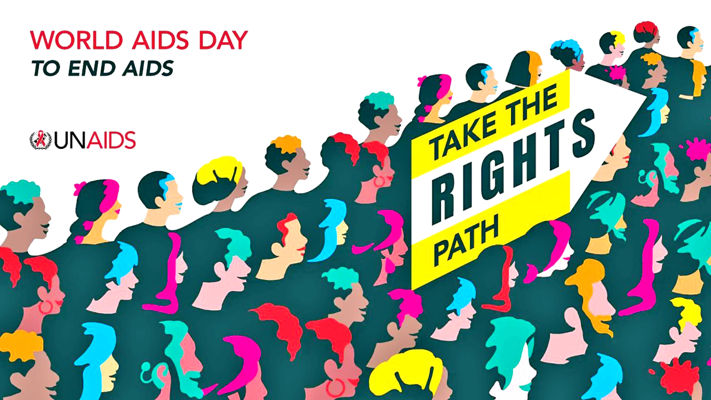
“The fight against AIDS is not just a medical battle; it’s a human fight for dignity and respect”
Dr Ashaq Hussain
World AIDS Day, observed annually on December 1, serves as a powerful global reminder of the enduring fight against HIV/AIDS and the importance of solidarity in ensuring health rights for all. This year’s theme, “Take the Right Path: My Health, My Right! encapsulates the fundamental belief that access to quality healthcare, prevention, and treatment for HIV/AIDS should be universal, free from stigma and discrimination.
While medical advancements have transformed HIV from a life-threatening diagnosis to a manageable condition for many, significant challenges persist. Social stigma, misinformation, and unequal access to healthcare remain formidable barriers. This year’s theme calls upon the global community to empower individuals to claim their health rights and work collectively toward eradicating these barriers.
Talking about, the power of choice and resilience, take for instance, the story of Kajal, a spirited 19-year-old whose life was upended by an HIV diagnosis. Initially ostracized by her community due to stigma and misinformation, Kajal found hope through compassionate healthcare workers who guided her to antiretroviral therapy (ART) and a supportive network. Today, she is not just a survivor but an advocate, inspiring others with her resilience and determination. Her journey underscores the transformative power of informed choices and accessible healthcare, illustrating the “right path” in action.
Although there is Progress as well as persistent challenges, yet Scientific and public health advancements have significantly reduced the lethality of HIV/AIDS over the past decades. Today, with tools like antiretroviral therapy, pre-exposure prophylaxis (PrEP), and comprehensive testing, the disease is no longer the death sentence it once was. However, its impact remains devastating, particularly in regions plagued by healthcare disparities.
As of 2024, over 39 million people live with HIV globally. Many face obstacles to education, testing, and treatment due to poverty, structural inequities, and social stigma. In these contexts, the fight against HIV is not just a medical issue but a battle for human rights. Health, as a basic human right, must be accessible to all, not just a privileged few.
At present combating stigma is a critical priority, as Stigma remains one of the most formidable barriers to eradicating HIV/AIDS. Fear of judgment often prevents individuals from seeking testing or treatment. To overcome this, we must foster inclusive environments that are compassionate and non-judgmental. Community-led programs that educate and engage people, especially the youth, are vital in dismantling stigma and encouraging open conversations about HIV.
Governments and organizations worldwide must also prioritize equitable healthcare systems. Bridging treatment gaps, especially in low-income regions, and addressing social determinants like education, employment, and housing are crucial steps toward ensuring that no one is left behind.
Education is the key to empowerment and it is the education that plays an instrumental role in the fight against HIV/AIDS. Comprehensive sexuality education equips young people with the knowledge to make informed decisions, recognize risks, and advocate for their rights. Public campaigns that highlight stories like Kajal’s can inspire hope and normalize proactive healthcare behavior, making strides toward a stigma-free future.
Today here is a call to action for one and all, as we mark World AIDS Day, “Take the Right Path: My Health, My Right!” is both a rallying cry and a reminder of the progress yet to be achieved. Ending the HIV/AIDS epidemic demands collective action. Governments must implement and enforce policies that protect health rights. Healthcare systems must prioritize inclusivity and accessibility. And individuals must be empowered to make informed choices that ensure their well-being.
Together, we can envision a future where HIV/AIDS is no longer a global health crisis but a managed condition with equitable care for all. Walking the right path means ensuring that everyone, regardless of geography, gender, or socioeconomic status, has the opportunity to lead a healthy and dignified life. Let us honor the courage of those like Kajal and commit to creating a world where health is a universal right and not a privilege.
(The author is Associate Professor Chemistry at Govt Gandhi Memorial (GGM) Science College, Jammu)

